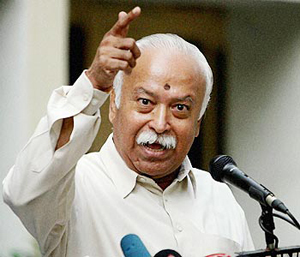Bengaluru, Mar 3: RSS chief Mohan Bhagwat today said the new generation needs to be taught to chant slogans hailing mother India, comments that come against the backdrop of a raging row over alleged anti-India sloganeering on the JNU campus.
"Now the time has come when we have to tell the new generation to chant `Bharat Mata Ki Jai' (hail mother India). It should be real, spontaneous and part of all-round development of the youth," he said.
Bhagwat, without making any direct reference to the JNU controversy, said this is necessary as "some forces" are telling the youth not to say "Bharat Mata Ki Jai".
The Delhi-based Jawaharlal Nehru University (JNU) hit the headlines in early February when a group of students allegedly raised anti-India slogans during an event organised on the death anniversary of Parliament attack convict Afzal Guru. Police later filed a sedition case in which three students, including the JNU students union president Kanhaiya Kumar were arrested.
Bhagwat was speaking at RSS headquarters in Reshimbagh during an award giving function. On the occasion, the RSS chief presented "Matrashakti" award to social activist Sindhutai Sapkal.




Comments
O Bharath Priya first you hoist tricolor flag in RSS office then you can talk about Bharath Matha Ki
Barking dog never bites n it proved barking for certain period.
Israel backed training will not work in India. Even though they kill their own leading person for the benefit. Major peace loving Indians around the globe know what is rss n what is their trend. They never come in front line they use sword & gun with the help of innocent third person. They always use third innocent persons shoulder and hand to spread communal clash.This moochkanda is the example to all public.
Dear all never trust or believe his foolish statements.
We are and we will be one.
First host Indian flag at all Rss units all over india, then ask others to chant Bharath......Jai. Don't try to fool educated younger generation.Keep your advice upto modi and team.Can you please replace full pant with half pant for your cadre, its too old fashion.
No need to teach your blind belief to others we all know to love our country. Our acts shows the love of country. Country is a country a nation that's it can't be a women or God , god created this world so we say ' God is great' ....
You can only advice but not compel....
And just by saying this would not prove your patriotism
Add new comment